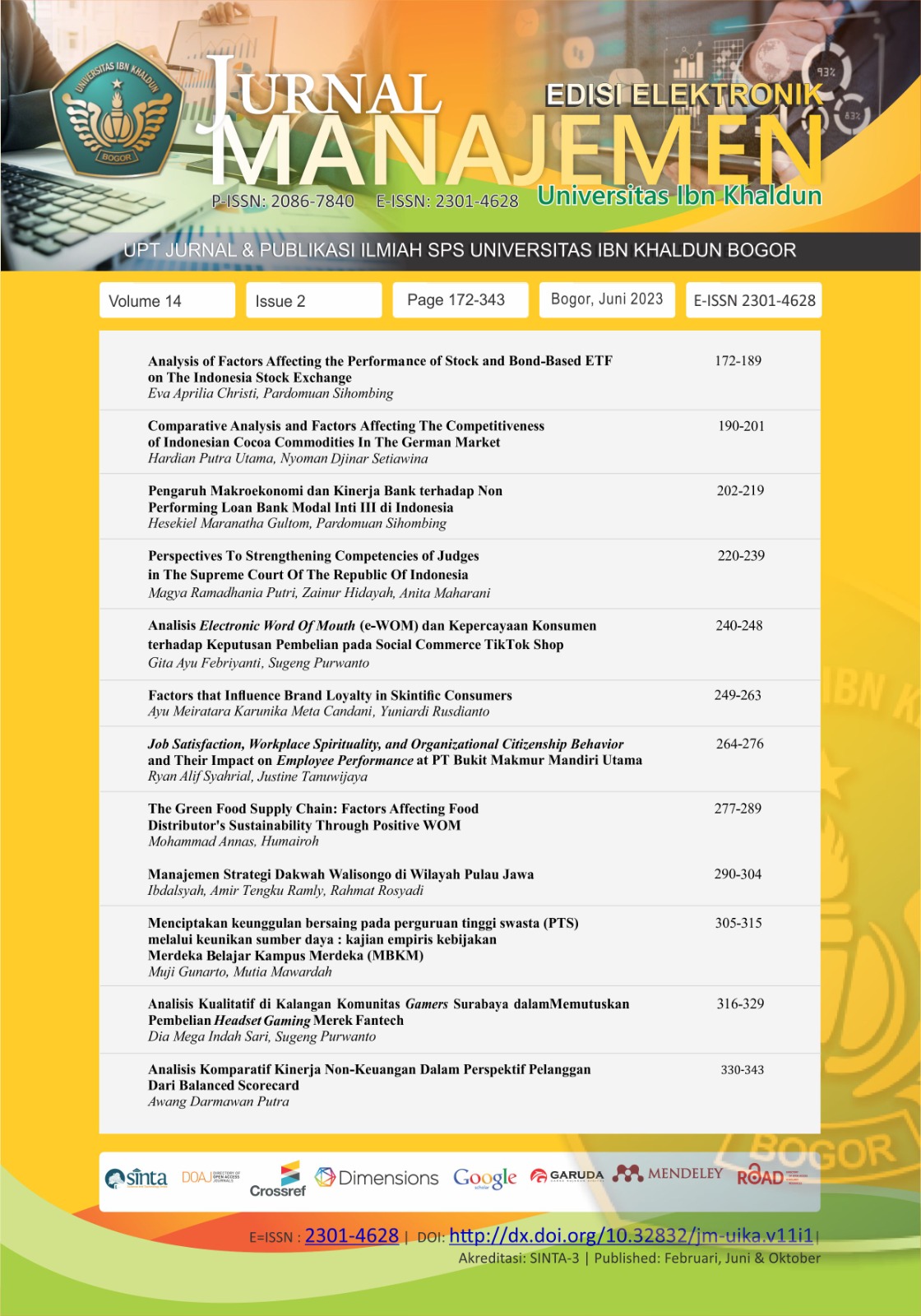Analysis of Factors Affecting the Performance of Stock and Bond-Based ETF on The Indonesia Stock Exchange
DOI:
https://doi.org/10.32832/jm-uika.v14i2.9418Keywords:
ETFs, , Risk, , Tracking Error, , Expense Ratio, , Stock, , BondAbstract
This study aims to determine the analysis of factors that affect the performance of stock and bond-based ETFs on the Indonesian stock exchange. This research was conducted on stock and bond-based ETFs listed on the Indonesian stock exchange for the period 2019-2021. The sampling technique used in this research is purposive sampling. The samples in this study were 13 stock-based ETFs and 1 bond-based ETF sourced from Bloomberg, the Indonesian stock exchange website, ETF prospectus and asset management website. The data analysis method used is panel data regression analysis with the EViews program tool. The results of this study indicate that Risk affects the performance of stock and bond-based ETFs, Tracking Errors affect the performance of stock and bond-based ETFs, Expense Ratio has no significant impact on the performance of stock and bond-based ETFs.
Key Words: ETFs, Risk, Tracking Error, Expense Ratio, Stock, Bond
References
Adiputra, Banyu K.U., M. (2014). The Analysis on the Determinants of Passively Managed Equity Based ETF Performance. Jakarta. Tesis Program Magister Manajemen, Fakultas Ekonomi dan Bisnis, Universitas Indonesia.
Anshori, M., & Shofiyuddin, M. A. (2021). Pengembangan Exchange Traded Fund Syariah Indonesia: Peluang dan Tantangan. Jurnal Ilmiah Ekonomi Islam, 7(01), 55-66.
Bursa Efek Indonesia. (2020). Kajian Materi Edukasi ETF Podcast 2021. Jakarta
Bursa Efek Indonesia. (2020). Informasi data ETF di Indonesia. Jakarta
Bursa Efek Indonesia (2021) Indonesia's Economic and Capital Market Development. Jakarta
Bursa Efek Indonesia. (2020). Kajian Materi mengenai Exchange Traded Fund. Jakarta
Elton, E.J., Gruber, M.J., Comer, G. & Li, K. (2002). Spiders: where are the bugs? journal of Business, Vol. 75 No. 3, pp. 453-72.
Elton, E.J., Gruber, M.J., & Busse, J.A. (2004). Are investors rational? Choices Among Index funds. The Journal of Finance, Vol. 59, No. 1, pp. 261-288.
Elton, Edwin J.Gruber, Martin J. Blake, Christoper R. (1996) . The Persistence of Risk-Adjusted Mutual Fund Performance. The Journal of Business. Vol.69, No. 2 (April 1996), pp. 133 – 157
Frino, A., & Gallagher, D.R. (2001). Tracking S&P 500 Index Funds. Journal of Portfolio Management, Vol. 28, No. 1, pp. 44-55.
Gardner, R. & Welch, J. (2005). Increasing after-tax return with exchange-traded funds. Journal of Financial Planning, Vol. 18 Issue 6, p30.
Gallagher, D.R. & Segara, R. (2005). The performance and trading characteristics Of exchange traded funds. Working Paper.
Gayatri., & Widhiyani, N.L.S. (2021). Kinerja Investasi Exchange Trade Fund di Indonesia. E-Jurnal Akuntansi, 31(7), 1632-1643
Gede Mekse Korri Arisena. Buku Ajar Pengantar Statistika. Prodi Agribisnis Fakultas Pertanian Universitas Udayana
George Tsalikis & Simeon Papadopoulos (2019). ETFS – Performance, Tracking Errors And Their Determinants In Europe And The USA. Department of Accounting and Finance, University of Macedonia, Thessaloniki Greece. International Journal
Haryanto, A. (2018). Evaluasi Kinerja Exchange Traded Funds (ETF) IDX30 berdasarkan Indeks IDX30 dan IHSG.
Hadi, N. (2015). Pasar Modal. Yogyakarta: Graha Ilmu.
Maria Rio Rita (2008). Exchange Traded Fund (ETF): Inovasi Dalam Dunia Industri Reksa Dana Di Indonesia. Jurnal Ekonomi dan Bisnis.
Markowitz, Harry. (1952). Portofolio Selection. The Journal of Finance. Vol.7, No.1 (Mar.,1952), pp. 77-91
Markowitz, H. M. (2010). Portfolio Theory: As I Still See It. Annual Review of Financial Economics, 2, 1–23. https://doi.org/10.1146/annurev-financial 011110-134602
Maulidya Annuru, dkk (2020). Pengaruh Expense Ratio, Portofolio Turnover, dan Fund Flow Terhadap Kinerja Reksa Dana Saham Di Indonesia Tahun 2015-2017. Jurnal Akuntansi, Perpajakan dan Auditing. Vol.1, No.2, Desember 2020, hal 234-248.
Miftahusni, Nundy (2020). Analisa Faktor Yang Mempengaruhi Kinerja ETF Berbasis Saham Skripsi Program Sarjana Fakultas Ekonomi dan Bisnis, Universitas Diponegoro, Semarang.
Nundy Miftahusni, Harjum Muharam (2021). Kinerja Exchange – Traded Fund (ETF) yang Dikelola Secara Pasif dan Faktor yang mempengaruhinya. Diponegoro Journal Of Management Volume 10, Nomor 1, Tahun 202, Halaman 1-8.
Petajisto, A. (2011). Inefficiencies in the pricing of exchange traded funds. SSRN Working Paper, No.2000336
Pope, Peter F. & Yadav, Pradeep K. (1994). Discovering errors in tracking error. The Journal of Portfolio Management Winter 1994, Vol. 20, No. 2: pp. 27.
Rompotis G.G. (2012). The german exchange traded funds.The IUP Journal Of Applied Finance, Vol.18, No.4.
Rompotis, Gerasimos G. (2006). The Performance of Swiss Exchange Traded Funds By Gerasimos G. Rompotis ∗. (August 2006).
Rompotis G.G. (2013). Actively vs Passively managed exchange traded funds. The IEB International Journal of Finance, 116 -135.
Sihombing, P. (2018). Corporate Financial Management. PT. Penerbit IPB Pres:Bogor.
Tandelin, Eduardus. (2017). Pasar Modal: Manajemen Portofolio dan Investasi. Kanisius.
Welch, S. (2013). On performance & tracking error in exchange-traded funds And index mutual funds. Accounting and Finance Faculty Publications, Paper 7.
Wilman San Marino, Ai Siti Rohanah (2021) Pengaruh Covid-19 Terhadap Pasar Modal di Indonesia. Jurnal Perbankan dan Keuangan.
Weston, J. Fred, an Eugene Brigham. (1994). Dasar-dasar Manajemen Keuangan, Bandung: Erlangga
Downloads
Published
How to Cite
Issue
Section
License
Copyright (c) 2023 Jurnal Manajemen (Edisi Elektronik)

This work is licensed under a Creative Commons Attribution-NonCommercial 4.0 International License.
Authors who publish with this journal agree to the following terms:
- Authors retain copyright and grant the journal right of first publication with the work simultaneously licensed under a Creative Commons Attribution-NonCommercial-ShareAlike 4.0 International License that allows others to share the work with an acknowledgement of the work's authorship and initial publication in this journal.
- Authors can enter into separate, additional contractual arrangements for the non-exclusive distribution of the journal's published version of the work (e.g., post it to an institutional repository or publish it in a book), with an acknowledgement of its initial publication in this journal.
- Authors are permitted and encouraged to post their work online (e.g., in institutional repositories or on their website) prior to and during the submission process, as it can lead to productive exchanges, as well as earlier and greater citation of published work (See The Effect of Open Access).











